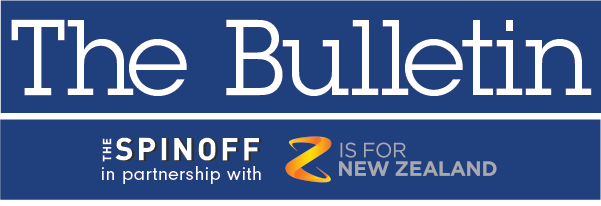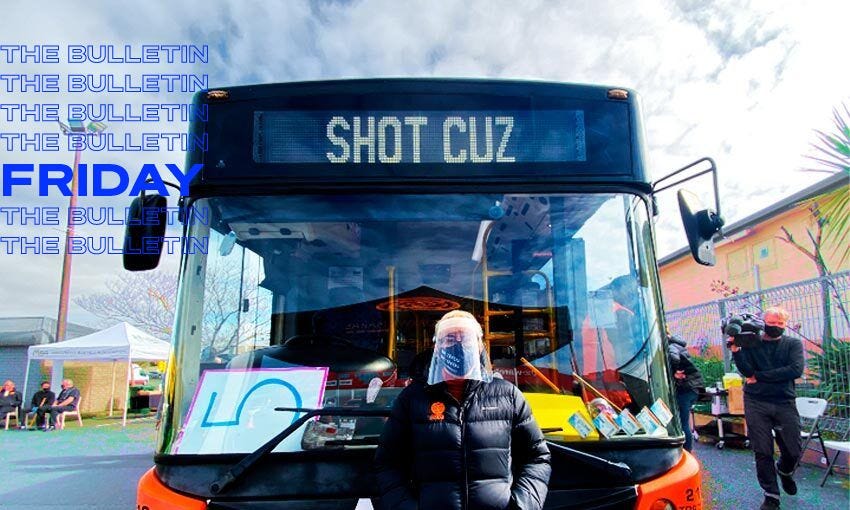The big week
This was one of most consequential weeks yet for the country’s Covid-19 response and here are the highlights
Mōrena and welcome to The Bulletin for Friday, October 8, by Justin Giovannetti. Presented in partnership with Z Energy.
In today’s edition: Find your suburb’s vaccination levels; community-based quarantine considered; government’s electric car plan falters; but first, the week when nearly everything changed.
A confusing and important week for New Zealand. It’s getting easier to chart the road to Christmas after what has been one of the most tumultuous and consequential weeks in New Zealand’s Covid-19 response. From Monday, there has been a fair amount of improvised decision making, muddled communications and second-guessing. Put another way, the country caught up with a year’s worth of the Covid announcements and debates seen overseas in a single week.
Here are some highlights:
The elimination strategy is now past tense, but restrictions aren’t. The prime minister announced on Monday that the country can’t eliminate Covid-19 as the delta variant has continued to spread in Auckland and Waikato. However, the partial lockdown and restrictions of level three aren’t going anywhere soon. Opposition leader Judith Collins told Stuff she’d like to see Auckland’s lockdown lifted by Christmas.
There’s a new three-step ladder for Auckland. Before the city can leave level three, it has to go up three steps. The first one, which has been in effect since Wednesday, allows picnics and outdoor gatherings between two bubbles. Step two allows retail and public facilities to open, while hospitality and larger groups can gather in step three.
Level three settings have twice been extended in Waikato. Parts of Waikato, including Hamilton, were put into level three lockdown on Sunday. With 22 cases in the region as of Thursday, the lockdown has been extended further south and now includes Te Kūiti.
The spread of Covid-19 by gang members has become a focus. Stuff reports that “quite a number” of gang members were infected in the country's latest outbreak, according to the Covid-19 response minister. Stuff understands that border breaches by some gang members may have contributed to the spread of the virus into Waikato.
Vaccine certificates are coming next month. Some of the details haven’t been ironed out yet, but it’s likely large events this summer will only be open to vaccinated people carrying proof in the form of a QR code.
The vaccine gap has been shrunk to three weeks. After officials widened the gap between doses in August to six weeks—using new research overseas that the gap might make the jab more effective—they’ve now shrunk it back to three weeks. Part of the reasoning is to get more people fully vaccinated before new vaccine restrictions come into play.
Some vaccine mandates are coming. Cabinet is considering requiring vaccination for teachers, as reported by the NZ Herald. Outside of border staff, mandates are seen as a last-resort by the government. However, all non-citizens arriving in the country from next month will need to be fully vaccinated and travel a fortnight after their second dose.
An election-style vaccination event is planned. Officials have set October 16 as a big push to get jabs for the minority who are still unvaccinated. Public leaders will be out and there’s hope that the equivalent of the entire population of Wellington could be vaccinated on that one day.
There’s a renewed emphasis on saliva and rapid testing after a critical report. The government has pledged to roll out rapid antigen testing in Auckland hospitals within days after a review concluded it has been too slow to act. The rapid tests will also be used in the upcoming home-isolation trials for a few business travellers.
Charges after a big anti-lockdown protest. Destiny Church’s Brian Tamaki and a second person have been charged for the protest at the Auckland Domain where over 1,000 people gathered. A second protest is planned in the near future.
There's been an outcry over low Māori vaccination rates. The group has the lowest vaccine uptake among the four ethnicities tracked by the health ministry. The situation is made worse by poverty, overcrowding in homes and a suspicion of government that’s frankly well-earned.
The pressure on the country’s hospitals is becoming clearer. Intensive care specialists warned this week that the country’s Covid-19 plan won’t work without elimination due to staffing shortages in ICU. The government’s plan to surge capacity in hospitals would require shutting down most other activities in the health sector and aren’t sustainable in the longer term.
The country's 28th Covid death was reported. According to One News, the man, a father of five, was a leader at the Assembly of God Church in South Auckland. He spent 40 days in Middlemore's ICU and his wife is still in hospital battling the virus.
If you like what you’re reading, we need your support.
A special note from The Spinoff publisher Duncan Greive: Without wanting to get too Bernie Sanders-meme with it, I am once again asking you to consider donating to help The Spinoff in its hour of need.
The delta outbreak struck just as we had made a major investment in new hires to grow what we can bring you on The Spinoff. We now have a head of data creating powerful charts to map the spread of the virus and rollout of the vaccine, a CTO to rebuild our site and upgrade our security and multiple brilliant new writers and editors like Reweti Kohere, Madeleine Holden and Chris Schulz. They are all creating important work under highly constrained circumstances — as are the rest of our 20-strong editorial team. Unfortunately delta has had a significant impact on our partnership work, which makes us more reliant than ever on the support of our audience.
So — if you're part of The Spinoff Members, thank you, from all of us. If you're not, and can donate, please do so today using this link — to keep on keeping on, we need you right now.
(A reminder: Every dollar donated through The Spinoff Members is ring-fenced to create more of our homegrown and independent journalism.)
A new way to look at vaccination rates. Harkanwal Singh, mentioned just above by Duncan, has built a map for The Spinoff that looks at vaccination data for every suburb in the country. He’s been tweaking the system for the past day and the result is something that’s mildly addictive. I’ve learned that my Lower Hutt suburb and the capital region is doing pretty well, but some pockets of the country still need help.
The Covid numbers: 24 new community cases were reported yesterday in Auckland and 5 in Waikato. 72% (28) of the previous day’s total were in the community while infectious. There are now 363 active cases. 70,198 people were vaccinated Wednesday.
The Spinoff’s Covid data tracker has the latest figures.
A legal showdown is underway to raise Māori vaccination levels. John Tamihere, the chief executive of the Whānau Ora Commissioning Agency and a former Labour minister, is taking the ministry of health to court because of its refusal to hand over the personal details of unvaccinated Māori. According to Stuff, the agency has a plan to boost vaccination rates, but the government is standing in the way. Tamihere dismissed the ongoing vaccine effort as a plan for middle class New Zealand and made his point succinctly: “Give us our bloody information so we can go out and do the job that you haven’t done.”
Plans are being drawn up for community-based quarantine in the event of a larger outbreak. As Stuff reports, the country's managed-isolation system has taken in most community cases in recent weeks, but the number of rooms is limited and could fill in a week at current rates. The move follows another lottery for border slots this week that saw tens of thousands of would-be returnees leave empty handed. A returnee waiting in Europe wrote for RNZ that the vitriol directed at them on social media by New Zealanders has been heartbreaking.
The government’s plan to decarbonise its vehicle fleet is going to miss its target by half. Only half of government vehicles will be electric by a 2025 deadline, which means agencies will need to start buying carbon offsets, according to Newsroom. About 260 electrics, including 91 plug-in hybrids, are now in a government fleet of over 15,000 vehicles. The Labour campaign promise to electrify directed departments to only make the switch when “practicable” and a cabinet paper found that about 51% of all government vehicles didn’t meet that test.
A fast-track to put Dunedin hospital on the fast-track. A former environment court judge has been put in charge of a panel deciding if the city’s new hospital can get fast-track consent, according to the Otago Daily Times. The nearly $1.5 billion project was given the green light to attempt to speed things up under Covid-19 legislation.
Got some feedback about The Bulletin, or anything in the news?
Get in touch with me at thebulletin@thespinoff.co.nz
Right now on The Spinoff: Chris Schulz writes about Good Grief, which could be the next Flight of the Conchords. Tara Ward has your latest Celebrity Treasure Island fix with power rankings as things get emotional. Chris Price introduces The Lobster's Tale, a new book that watches the climate crisis lurch from nightmare to reality. Matthew Rosenberg reports on an anti-mining activist fighting to end mining in her small Southland town. Jihee Junn (partnership content) explains what a B Corp is and why New Zealand businesses are joining the movement.
For a longer listen: The Detail takes on the legacy of James Bond as the latest movie is released in the 59-year-old film series. Love them or hate them, most people have seen a Bond film and they've had a deep impact on modern cinema. With the end of the Daniel Craig era, which was repeatedly delayed by Covid-19, it’s time to look at the future of the franchise and how it’s changed to reflect a more modern world.
The rugby season is probably over for three Auckland area teams. Auckland, North Harbour and Counties Manukau wanted to compete in the national provincial championship, but applications to cross the Auckland boundary were denied by the ministry of health. As Stuff reports, a Super City Series could be created for the teams, but the financial hit is going to be significant. NZ Rugby is considering financial support, but the body itself is haemorrhaging cash.
That's it for The Bulletin. If you want to support the work we do at The Spinoff, please check out our membership programme.







